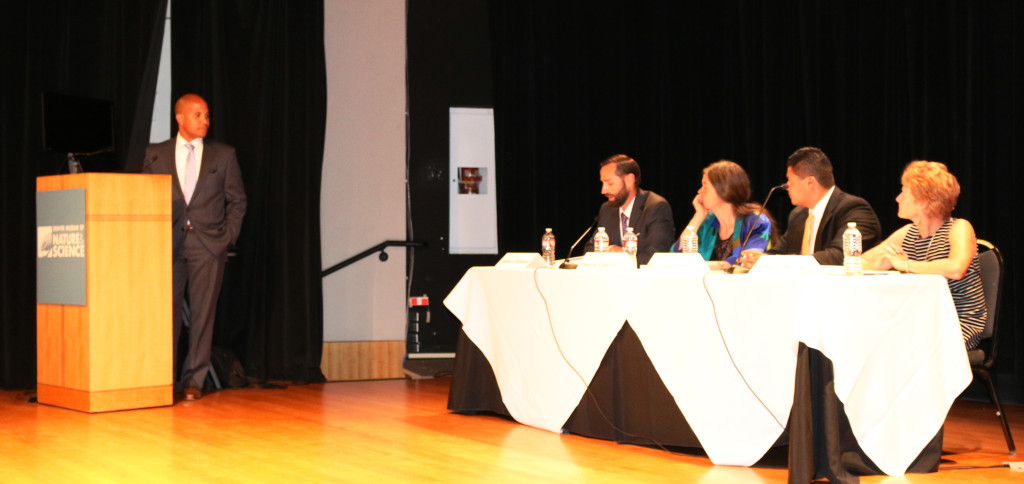
Forty million people receive water from the Colorado River. If those who sip from the river were a country, they’d be slightly less populous than Argentina.
With so many people impacted by the Colorado and the state’s other rivers, a state water plan has been a major focus over the past year. As final comments are being collected the draft of the plan, the Denver Metro Chamber of Commerce and other organizations are providing feedback to encourage measurable outcomes that include conservation, storage and efficiency.
At the Denver Metro Chamber Leadership Foundation’s Fall Forum, a panel of four leaders immersed on the topic of water discussed the history of water in Colorado and where we’re heading. Here’s how they think business and civic leaders can stay involved with protecting this precious resource:

Patricia Wells, general counsel for the Denver Board of Water Commissioners
I would encourage business and non-water nonprofits to be engaged in water issues and to become more educated. Those of us in the water world often have tunnel vision: Whatever uses less water is good and whatever uses more water is bad. We tend to ignore externalities. For example, swamp coolers are bad because they use more water than air conditioning, but we ignore the greater use of energy and carbon footprint. Water interests in Southwest Colorado have called for, and wish to mandate, dramatic reductions in urban outdoor water use, ignoring the enormous economic and societal benefits of urban landscape—property values, better air quality, reduced heat island effect, water pollution control. Everyone should be involved in water efficiency, as the (Denver Metro) Chamber has recommended in its comments on the water plan. We should be able to make great strides in efficiency and best practices. However, we need to be sure we keep externalities in mind. Less might be only less, not better. Business and community-based organizations have an important role to play in providing perspective and ideas to water use issues.

Marco Ugarte Irizarri, manager of water and energy sustainability for MillerCoors
Once businesses and nonprofits have acknowledged their interdependence, they are prone to pool their resources collectively for the greater good. Specifically, nonprofits and NGOs (nongovernmental organizations) can bring a wealth of expertise and further community engagement opportunities; businesses facilitate the integration of efforts while bringing additional partners such as corporations, federal government, foundations and universities.
Education and awareness among stakeholders is critical before any initiative can be effectively rolled-out. Therefore, having a scientific understanding of the situation prior to allocating resources is very important. From a state-level, a community of informed stakeholders represents a significant competitive advantage, as their individual and collective decisions are backed by knowledge and understanding that can positively affect the spheres where they operate (i.e. government, civil society, business, academia, etc.) in order to advance strategic water stewardship.

Patty Limerick, faculty director and chair of the Center of the American West at the University of Colorado
Leaders of businesses and nonprofits, and the (Denver Metro) Chamber itself, are ideally positioned to cross the boundaries and borders of professional specialization, and initiate and conduct conversations (from one-on-one exchanges to events like the Fall Forum) that scramble the usual categories of specialization and fragmentation. And I heartily second Patti Well’s accent on “externalities”: compared to many substances and materials that humans use, water arouses surprisingly little interest in calculating the bigger picture of its cost and appropriate pricing.

James Eklund, director of the Colorado Water Conservation Board
Continue engaging on water! Colorado’s Water Plan has seen multiple and repeated comments and a high level of engagement from individual businesses, the Denver Metro Chamber and other business organizations throughout the state (closing in on 26,000 total comments to date). But this conversation is just beginning and requires the continued involvement of the business community to be successful. Colorado’s water plan should demonstrate that we’re really leaning in to listen to the challenges and opportunities from the business community’s perspective. With that perspective, we’re much more likely to develop policies that equip businesses to make decisions about how they can manage water to achieve a net benefit to Colorado and themselves. Without it, as Patty Limerick and Patti Wells point out, we risk making net-negative decisions or policy ignorant of negative externalities. In short, keep engaging on Colorado’s water plan, and thank you for all you’ve done to make the product better!
Sara Crocker is the communications manager for the Denver Metro Chamber of Commerce.
